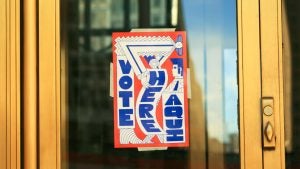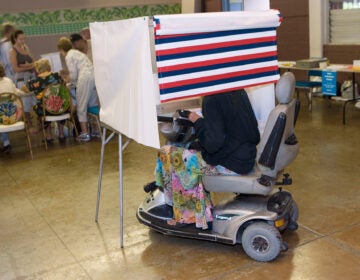New Jersey seeks to pass its own Voting Rights Act
Assembly Democrats said the law, inspired by the late U.S. Rep. John Lewis, would ban deceptive election practices, and establish a statewide voting database.

A closeup of the New Jersey Statehouse in Trenton. (AP Photo/Matt Rourke)
New Jersey lawmakers want to pass legislation that sponsors said would ensure elections in the state are secure and fair for historically marginalized groups and “future generations of voters.”
Next month, Assemblywoman Verlina Reynolds-Jackson (D-Mercer) said she plans to introduce a statewide measure inspired by the federal “John Lewis Voting Rights Act,” which has been stalled in the U.S. Senate since September 2021.
Reynolds-Jackson also named her bill after Lewis, the late Georgia congressman who spent his career fighting for fairer elections and racial equality.
“When you can’t get it done at the federal level, I think we have to send a message by the state — and say ‘state, are you with or against us?’” Reynolds-Jackson said.
The legislation would invest more resources into raising public awareness about upcoming elections and ensuring people of color and non-English speakers can fully participate in the political process.
Assembly Democrats said it would ban deceptive practices, establish a statewide voting database, and make electronic interference a misdemeanor crime.
“Discrimination and interference at the polls have historically marginalized black and brown communities. The John R. Lewis Voting Rights Act of New Jersey will reinforce the right of any person to participate in government elections free of intimidation and interference,” Reynolds-Jackson said. “We must ensure all NJ voters are always free to cast their ballot without any encumbrances placed on them at both the state and local levels.”
Philip Hensley, a democracy policy analyst with the League of Women Voters New Jersey, said the legislation would create more robust protections against voter suppression.
“A New Jersey Voting Rights Act is encouraging to us because it will put in place protections against racial discrimination, against racial suppression, or vote dilution, that are tougher and are clearer than federal law,” Hensley said.
He also said it would allow the state to take more preventative methods to ensure communities have equitable access to the polls.
“We can’t predict the future of voting rights in New Jersey or the United States, but we don’t want to wait to put policies in place…until our votes are taken away,” Hensley said. “So that’s why it’s so important to pass a bill like the New Jersey Voting Rights Act, to put policies in place that will prevent discrimination and racial bias suppression before they happen.”
New York, the Garden State’s neighbor to the north, enacted a similar law in June.
It comes as many states pass laws restricting access to voting, and amid false claims by some Republicans that elections were stolen from members of their party, including former President Donald Trump.
While New Jersey state already has some of the strongest voter protections in the nation, some lawmakers and advocacy groups are pushing for more.
This year, Reynolds-Jackson introduced legislation that would allow voters to register to vote up to two weeks before an election. She is also a co-sponsor of a measure that would permit same-day voter registration in New Jersey.
The same-day voter registration bill is reportedly in limbo after Senate President Nick Scutari (D-Union) signaled he did not support it.
“Someone’s got to convince me why people have the sacred right to vote, and they can’t decide they’re going to do it until that day,” Scutari told NJ.com in March. “Right now, I’m not willing to post it. Make the case.”
Currently, New Jersey allows people to register to vote up to three weeks before an election.
“We know the Senate is where we face resistance, unfortunately,” Hensley said. “And so I think it just points to the fact that New Jersey voting laws aren’t as accessible and as equitable as they could be, because lots of other places have same-day voter registration. We still don’t.”
WHYY is your source for fact-based, in-depth journalism and information. As a nonprofit organization, we rely on financial support from readers like you. Please give today.







